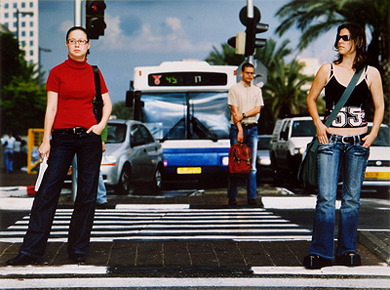 I was searching for Boruchov Street.
I was searching for Boruchov Street.
In the early afternoon, after the rain, I went searching for Boruchov Street. It wasn’t on the map, this Boruchov Street, not on the one in my guidebook anyway, but at the hotel I was told the general direction of Boruchov Street and noted it on that page with the map with a pencil. I left my hotel near the sea, my book in hand, wearing my worn wax jacket that I bought years ago in England in case of further rain. I walked south, in the direction marked on my map, heading for Boruchov Street, with my camera. I brought my camera, my father’s old Nikon, to take pictures for my uncle. The streets were wet and reflected the buildings lazily. I took a left and walked eastward two blocks, turning then south onto Dizengoff. I marched down Dizengoff, a famous street where tourists flock. But as it was the Sabbath the stores that line both sides of the street were closed. So I was alone, walking towards Boruchov Street, in the hazy early afternoon, and the stores along Dizengoff were closed. When I began my search there were few people milling about Dizengoff. It was the Sabbath, after all. But I was off to find Boruchov Street.
I did not want to go to Boruchov Street particularly. I wanted to sleep late, find an open café and sit and drink, and, if I could, find a copy of the Herald Tribune for information about America, which I half-heartedly missed. But I had promised my uncle. So I continued south down Dizengoff, past closed souvenir shops and empty falafel stands, staring at slowly shimmering reflections on the wet streets and at the small number of people who also happened to be walking along Dizengoff or bravely sitting at tables outside the few open restaurants, mocking the clouds or the holy day. I wanted to join them, to have a casual lunch. I wanted to have a bowl of chicken soup with kreplach and a slice of warm bread, or Jaffa oranges and Arab sweets, and overhear talk about politics, and stare at pretty girls fresh from the army. But I had to find Boruchov.
It was vexing to me that Boruchov Street wasn’t on the map, even if it was such a small street. It made it more difficult to find, despite the help of the woman at the hotel by the sea, the pretty, freckled young woman with what I guessed was a South African accent who said yes, she had heard of it, that it was south, towards the Yemenite Quarter, yes, but not that far, and further east. I asked if she had a better map, for girls who work in hotels often do, and she shook her head and took mine from my hand and pointed to a blank space on it, a white crooked trapezoid, and said she believed Boruchov was somewhere there, in that blank space, and I marked the location in pencil. It was fairly simple to get there, she said, and to prove it she traced the route with a slim, ringed finger, down Dizengoff and unto King George to Rothshild which led into the white emptiness.
It was still early when I left the hotel by the sea and the sky was gently gray and I couldn’t be sure if it was or was not going to rain again, but as I forgot my umbrella in Jerusalem it did not have much further effect on my preparations. I put my camera in my backpack to keep it dry. I continued down Dizengoff, gazing in the storefronts as I passed them by. Their names were in Hebrew but I thought that otherwise the stores could have been in an American city, or somewhere else, like Paris, perhaps. The city wasn’t all that strange.
Yet it was important that I find Boruchov Street, and that I take pictures. Boruchov was a relative, or so I was told by my uncle, who knew. He had looked it up. Now I passed by an open falafel stand. A shwarma cost twelve shekels. A group of young Israelis stood around damp wooden benches and talked amongst themselves. I would have liked to join them, to hear their stories, to have them lead me to the places only natives knew about. The grizzled man behind the shwarma stand cut the strips of meat from the spit and they fell into the pita in his left hand. I put salad, tehina and the hot red sauce on my shwarma, which they make out of turkey and roasted on an upright spit but I heard used lamb fat on top for flavor. I ate it carelessly while I advanced toward for Boruchov Street, and again looked at my map, even though I knew I had a long way to go.
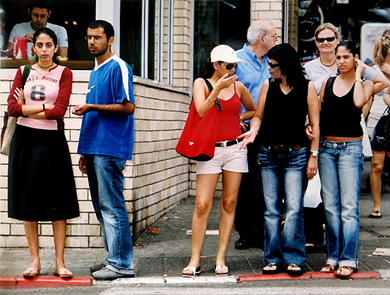 I ate the shwarma as I walked. Along the way I thought of Boruchov. I had never heard of him. Not until my uncle told me a few weeks ago. "Go. Find Borochov our uncle." I licked the sauce from my fingertips. Some fell on the page, near the sea. I wondered if the rain would start again. It looked as though it were clearing up. I continued along Dizengoff Street, checking my map from time to time although I knew I had a way to go until I hit King George Street, where I would have to turn. I walked slowly, staring into the store windows, looking at fine suits made in perhaps Milan and books with Hebrew and sometimes English titles, silver menorahs and mezuzahs made of pink Jerusalem limestone, like that city itself. During the day, the guide book proclaimed, the stone exterior of all of Jerusalem is blanched white, but, towards dusk, as the sun falls, it fades to a soft pink, like the little rectangular boxes in the window, which hide tiny parchment scrolls.
I ate the shwarma as I walked. Along the way I thought of Boruchov. I had never heard of him. Not until my uncle told me a few weeks ago. "Go. Find Borochov our uncle." I licked the sauce from my fingertips. Some fell on the page, near the sea. I wondered if the rain would start again. It looked as though it were clearing up. I continued along Dizengoff Street, checking my map from time to time although I knew I had a way to go until I hit King George Street, where I would have to turn. I walked slowly, staring into the store windows, looking at fine suits made in perhaps Milan and books with Hebrew and sometimes English titles, silver menorahs and mezuzahs made of pink Jerusalem limestone, like that city itself. During the day, the guide book proclaimed, the stone exterior of all of Jerusalem is blanched white, but, towards dusk, as the sun falls, it fades to a soft pink, like the little rectangular boxes in the window, which hide tiny parchment scrolls.
And so past Gordon, past Frishman. Further along the sidewalk rose up to Zina Kikar where that terrible sculpture spins around and shoots up water and fire when it deems appropriate. From the square I could see the ugly antennae protruding like awkward crucifixes from the buildings across, and the pink and turquoise of a hotel’s signs. There were a group of people about the square, some children dangling from their parents, a seller of balloons. I walked on. I had no time for balloons or children and their parents or colorful spinning sculptures spitting water and fire. I was looking for Boruchov. Dov Ber Boruchov, 1881-1917, the Zionist-socialist, uniter of the Poale Zion parties. In Jerusalem I asked a Zionist I had met if he had heard of Boruchov, and he said, "Of course." Of course he did; all Zionists knew of Boruchov, as did Israeli schoolchildren, who I believed were taught of his exploits in school. It was peculiar, though, that it was my uncle who was the one to tell me.
From the square where children roved free from their parents and surrounded the balloon man with their pleas I walked back down unto Dizengoff Street, which now eased to the left. I wondered what it would be like, Boruchov Street. Would it be industrial or residential? I had not been told. I hoped it would be residential. I hoped it would be idyllic, in the way innocent socialists muse. Uncle Boruchov was a socialist, a Zionist-socialist, the first to synthesize Zionism and Marxism. I wondered what it meant to be related to this Boruchov, a man I had never heard of, until my uncle told me, if it meant anything at all? I was not really a socialist, and I was not altogether sure if I was a Zionist, either, even though I had been told that I should be, by teachers years ago in Hebrew school who taught me tribal songs and recounted stories of heroic soldiers in the desert, and by the Zionist I met in Jerusalem who wore a knitted yarmulke and said yes, he knew of Boruchov. Becoming a Zionist would mean that I would have to commit-selling my belongings, leaving my father’s house, learning Hebrew.
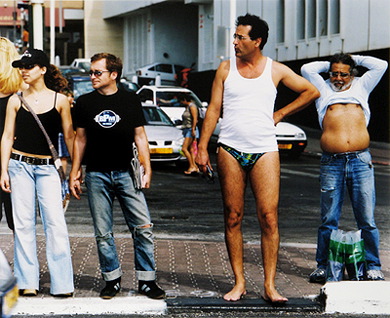 It was strange that my uncle told me. My uncle is a psychiatrist and, I believe, an atheist, although I have never asked. He told me about Uncle Ber last Thanksgiving, after much turkey and wine. After the meal, he took me into his office and in the light of his desk lamp showed me a series of clippings from encyclopedias and books. I had not known about Uncle Ber, as he referred to Boruchov, or even that I had an Uncle Ber, before he told me. He told me that there was a street in Tel Aviv, and that I should find it when I came. And that I should take pictures, and send him copies, so he would have a memento of Uncle Ber. So I walked down Dizengoff, which is a very famous street, known around the world it seems, like Broadway or the Champs Élysées, though few have heard of Boruchov. There are no statues or grand portraits of Boruchov, no teeming city squares which bear his name. I did not know what he looked like. He could have looked like my uncle, who is a handsome man, who would look at home in this city, with an apartment overlooking the sea. I could resemble him, for all I knew, with my few days of whiskers and almond eyes. But here I learned that he is not even on my map. Nonetheless, I thought it is meaningful to be related to someone with a street named after him, even if it is a small street, even if it is not on the map, which is why I hoped it would be a nice street, a residential one, with modest houses and young children playing in front. The street would be wet with the recent rain and would reflect the images of the children playing. Their colorful garments would form animated rainbows on the ground. That is what I would have liked. I wondered what Boruchov would have wanted. I wondered if a street with modest houses and children playing in front might prove too bourgeois for a Zionist-socialist. I hoped he would approve, but I thought it was more important that the street was to his liking rather than mine. I promised myself when I returned home I would look up Boruchov in the library, that I would learn all I could about Boruchov, that I would read all his speeches and essays, those, at least, which were translated. Perhaps I would learn what he looked for in a street.
It was strange that my uncle told me. My uncle is a psychiatrist and, I believe, an atheist, although I have never asked. He told me about Uncle Ber last Thanksgiving, after much turkey and wine. After the meal, he took me into his office and in the light of his desk lamp showed me a series of clippings from encyclopedias and books. I had not known about Uncle Ber, as he referred to Boruchov, or even that I had an Uncle Ber, before he told me. He told me that there was a street in Tel Aviv, and that I should find it when I came. And that I should take pictures, and send him copies, so he would have a memento of Uncle Ber. So I walked down Dizengoff, which is a very famous street, known around the world it seems, like Broadway or the Champs Élysées, though few have heard of Boruchov. There are no statues or grand portraits of Boruchov, no teeming city squares which bear his name. I did not know what he looked like. He could have looked like my uncle, who is a handsome man, who would look at home in this city, with an apartment overlooking the sea. I could resemble him, for all I knew, with my few days of whiskers and almond eyes. But here I learned that he is not even on my map. Nonetheless, I thought it is meaningful to be related to someone with a street named after him, even if it is a small street, even if it is not on the map, which is why I hoped it would be a nice street, a residential one, with modest houses and young children playing in front. The street would be wet with the recent rain and would reflect the images of the children playing. Their colorful garments would form animated rainbows on the ground. That is what I would have liked. I wondered what Boruchov would have wanted. I wondered if a street with modest houses and children playing in front might prove too bourgeois for a Zionist-socialist. I hoped he would approve, but I thought it was more important that the street was to his liking rather than mine. I promised myself when I returned home I would look up Boruchov in the library, that I would learn all I could about Boruchov, that I would read all his speeches and essays, those, at least, which were translated. Perhaps I would learn what he looked for in a street.
I wondered why my uncle wanted pictures. He was, after all, neither socialist nor Zionist: he was not particularly Jewish, for that matter, married, as he was, to an Ohio Catholic. They celebrated Easter with eggs and Hanukah with latkes and Christmas with a tree laden with twenty-six years of ornaments collected from a twenty-six year marriage. Why had he taken so much interest in Boruchov, his great-great uncle? Was it because he was getting old? Because he thought it was meaningful that he was related to Boruchov? It didn’t make any sense that he wanted to find Boruchov, yet he was the one who had originally done so, in an old edition of Encyclopedia Judaica. Searching for Boruchov, I passed Bar-Kochva, Bar Giyora, the American restaurants and movie houses and the Dizengoff Centre, with its shops and restaurants. . .
Who knows what to expect of Boruchov Street? Dancing girls in mauve dresses with tambourines among klezmer musicians with trumpets and fiddles? Rabbinic students in black frocks sitting on steps of brick houses with leather bound Talmuds on their laps, discussing obtuse tractates? Or young revolutionaries in tattered jackets, shouting verses of Marx and Engels to unheeding passersby? Merchants selling Oriental spices and copper tea sets? Angry Arabs muttering foreign curses? Tame lions walking among herds of white sheep, the skies filled with cooing white doves? 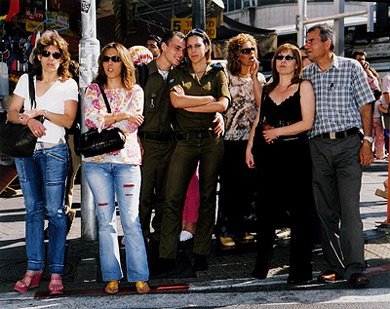
The sky was lightened; the sun was coming out. I was on my way, half way there to Boruchov, at the very least, and the sun was coming out. I wondered if the city would change color. If these ugly buildings of metal would be transfigured into gleaming pink stone, if the reflections in the street would dry up. I thought: if Boruchov was a socialist then he was probably not religious, but if he was a Zionist then he somehow considered himself a Jew. I was not religious either, though people told me that I was a Jew, whether I liked it or not. I wanted to know what did it mean to be a Zionist-socialist? To move to Palestine, to build the land, to improve the proletariat? To ferment class-conflict, to promote revolution? Eventually, wrote Boruchov, all national minorities would disappear, disintegrate into the proletarian masses, including the Jews. I kept a firm lookout for King George Street.
I would not have to walk much on Ha-Melekh George, but I wondered which George the street referred to. There were many King Georges. The map said George V, but the street sign did not. Did the map choose a George? Did they get it wrong? Which George was George V? What had he done? Was he the king who lost America?
I thought it was funny that one I had to follow King George to Boruchov, the monarch to the socialist. What is the logic of intersecting streets? Did the city’s planners take into account the peculiar dispositions and convictions of the men they would honor, kings and revolutionaries, heroes ancient and modern. Did they care whether or not their streets would get along, or did they strive for discord? Can the map of a city represent the movement of history?
Just one block on George then a left onto gentle tree-lined Sderot Ben Tsivon. Five blocks, and then unto Rothshild, who I knew was not a socialist…
And then I turned off Rothshild into the blank space. I did not take care to notice the street as my map could no longer serve me. I was left to my own devices. I hoped that I would be guided by ancestral instinct to Boruchov Street. I knew I was close, but there was a danger in being so, that I might choose a wrong street or make a wrong turn and in such a way get further from my desired destination. It would be easy to get lost in the blank space, in the mapless, uncharted area. To lose myself, to shift identities. Change my name, throw off my accent. And what if the woman at the hotel by the sea was wrong and Boruchov was not here in the blank trapezoid? Or what if there was no Boruchov, that my uncle was wrong too and I was here lost in the white space without a hope of finding Boruchov because it does not exist? What, then, would my Uncle Boruchov say?
I stopped for a moment in the middle of a street in the blank space, put my pack on the ground and stretched my arms. What was this blank space? Could I just hide here, rename all the streets, baptize them all Boruchov Street? Could I proclaim myself to all its residents heir of Boruchov, be invited by their leaders to lavish dinners where we would share our memories of Uncle Ber and feast on chicken soup and brisket and noodle kugel and drink tall glasses of the finest Manischevitz to his name? Would I sit among them and synthesize Marxism and Zionism, tell them to reclaim the land, set up kibbutzim, growing lemon trees and grape vines? Or would nothing stick, would the street names remain foreign, or blank, or forever metamorphosize, and would they find me here, sleeping on the ground, itinerant and wet, a tattered guidebook in hand? I checked my map, though aside from the ragged, indiscriminate pencil line it offered no guidance. I feared then that I might never find Boruchov Street, that I would not be able to take pictures of its gentle gait, of the blue street signs bolted onto its buildings, like those I remembered in Paris, but with names in Hebrew and English. If I couldn’t find Boruchov Street my quest would end in defeat, I would have traveled so far from the hotel by the sea in vain, failed to find my treasure, and I would return home without pictures for my uncle and descriptions of the splendor of Boruchov Street.
I had already wandered around the area, the blank trapezoid of my map, for quite sometime, peeking down one-way streets and cul-de-sacs, when I saw an elderly man groping towards me. He was slight, had a well-lined face, and wore a knit yarmulke. I thought he could be a grandfather. He could be my grandfather. I did not remember much about my grandfather. I remembered that when I was very young he brought me chocolate bars at my parent’s apartment in Brooklyn. When I arrived at Ben Gurion Airport I overheard someone say Welcome Home. Was the voice talking to me? Could it be that he was related to me as well? Was it that everyone in this country was related, or was that just what they all wanted to believe?
I decided to ask the elderly man who could have been my grandfather walking towards me for directions to Boruchov Street. I would ask him if he knew where Boruchov Street was. Perhaps he too was a descendent of Boruchov. I said phrases I learned from my guidebook: Shalom. Sleecha, ay-fo rechov Boruchov? stumbling over the strange words. Rechov Boruchov? he said, and then a burst of some words of Hebrew which I did not understand. I said in Hebrew that I didn’t speak Hebrew and he said some more words to me in his soft grandfatherly voice and I listened very hard, hoping that I might understand their meaning even if I did not know the language, that in this way we might converse, grandfather to grandson. Finally he took me by the shoulder, this man who could have been my grandfather, back in the direction which he came.
I wanted to tell him, as he led me, why I was looking for Boruchov. I wanted to tell him that Boruchov was the first to synthesize Marxism and Zionism, to argue that the national regeneration of the Jews was a step to the revolution, that he united the Poale Zion party, that he met Lenin in Belgium, who admonished him for his unorthodox views. He believed that nationality was not a super-structure, that Jewish liberation was a precondition to the advancement of the class struggle, in the class origin of anti-Semitism. That he was arrested and sent to a Russian prison from which he escaped; that he wrote essays about Zionist socialism and books about the Yiddish language; how, as a youth, he tried to take leave for Palestine from dreary Ukrainian Poltava, only to be returned home to his family from nearby towns. I wanted to tell him these things, but I did not know them. I wanted to tell him these things, but my grandfather spoke a language I did not understand. It was terrible that I could not talk to my grandfather, with whom I had never spoken and would never except for this moment. Perhaps if I had worked harder in Hebrew school, then I could tell him that Boruchov was my great-great uncle, that I was sent here to take pictures for my uncle, that I had never before heard of Boruchov and it was not on my map. That it was hidden somewhere within the blank space. That it was some kind of secret, concealed from the masses but revealed to the worthy. Perhaps if I had listened to my teachers instead of doodled in my notebooks and daydreamed about desert battles, about how I was a hero liberating Palestine from the British, but I had not known about Boruchov, or my grandfather. I did not know about anything about then, about Hebrew or Yiddish or socialist-Zionists. . . . Perhaps, perhaps if I had cared then, but I had only begun to care on my way to Boruchov Street.
We silently walked together, his hand on my shoulder. At the corner of a street he pointed and stayed still until I walked in the right direction. I walked and then turned and said Todah and Shalom and waved and he waved back and shouted, Shalom, still as I walked onto the street.
Onto Rechov Dov Boruchov, Uncle Ber’s Street, which I had searched for all afternoon.
A sign, partially blocked by a branch of a nearby tree, was fixed to the front of the house on the corner, proclaimed my destination. The street was empty, quiet, made up of rows of small modern apartments with rain-stained stone exteriors. There were no children, no people sitting on their porches, drinking glasses of Manischevitz or Golan wine. I continued down this lonely road. Battered Italian cars were parked on one side. It was a one way street. I was walking against traffic. Boruchov, I thought, would approve of that. 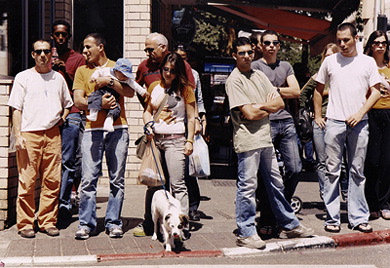 The name on the sign said "Boruchov" which was closer by a vowel to my uncle’s name, my mother’s name, than the Borochov in the encyclopedia. One letter more and it would be us, it would be our street as well. I thought about the difficulties of Hebrew vowels, of Ellis Island renamings.
The name on the sign said "Boruchov" which was closer by a vowel to my uncle’s name, my mother’s name, than the Borochov in the encyclopedia. One letter more and it would be us, it would be our street as well. I thought about the difficulties of Hebrew vowels, of Ellis Island renamings.
A store at the corner had a blue awning with a white wavy trim and sign for ROTHMANS KING SIZE. The store was closed, though. A notice board stood in front with fliers pasted to it in Hebrew, like the ones on the bus stops in New York. You could rip off a tag with a phone number on it. I wondered whose number it was. Could it be Boruchov’s? What would happen if I called and said who I was?
This was the last corner of Boruchov Street. Small, unimpressive to the uninitiated. I took a picture of the small blue sign on the side of store.
I crossed the street and entered the park. There were majestic palms like the feathers of some great bird. Dogs roamed free amount the park, scouting out the terrain and marking off territory. Babies slept peacefully in strollers guarded by watchful women. By a small fountain old women gossiped.
I took pictures. I took pictures of the palm trees and the lamps. I took pictures of the women and their babies and the dogs and the young men who kicked around a soccer ball. I took pictures until I ran out of film, and then remonstrated myself for not bringing another roll.
I sat upon an empty bench and put my camera away, and my guidebook. I looked up; the sky was clear now and the sun was beginning its descent to the west. From where I sat the sun was setting over America, my home, and I was watching it fall while there, at home, my family was enjoying the noonday’s glow.
Uncle Ber never arrived in Palestine, the encyclopedia said. He never walked down Dizengoff nor had an afternoon coffee in one of the sidewalk cafés. He never had a shwarma, nor did he peer into storefronts at pieces made of Jerusalem stone which glowed pink in certain light. He never tasted Arab sweets made of honey and pistachios or encountered the sticky delight of Jaffa oranges. He never walked along Rechov Dov Ber Boruchov. He never came to the park at the end of the street, where young men play football on Saturdays and old women sit by the fountain and talk about their grandchildren.







